Canada! Perhaps best known to fans of British soap operas, for whom it serves as that mysterious land to the west to which characters vanish after their purpose on the show has been served. Of course, all that is needed to learn far more about Canada than you would ever need or want to know is to get trapped in a conversation with a Canadian, uninvited exposition concerning their homeland being as natural to the average Canadian as it is any given inhabitant of a fictional utopia confronted by a woken sleeper from the pre-utopian past.
One might reasonably expect that most SF touching on Canada was written by Canadians and the Canadian-adjacent. Perhaps it is. Quite a lot of it is not. Here are five examples of Canada and Canadians in science fiction, as seen by foreign eyes.
Vertigo by Bob Shaw (UK) (1978)
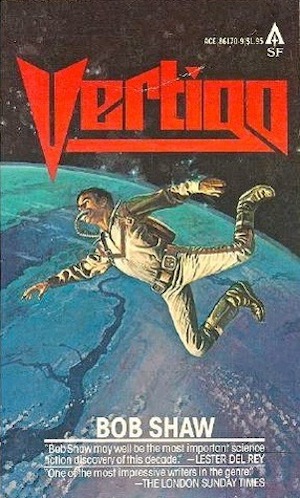
Contragravity gave humanity cheap, personal flight. This was a terrible idea. A casualty of the endless struggle to force fliers to conform to rudimentary safety rules, British Air Patrolman Rob Hasson is sent off to Tripletree, Alberta1 to convalesce from workplace injuries…and also to keep him safe from English gangsters until he can testify in an upcoming trial.
At first glance, Tripletree seems an unpromising rustic community innocent of civilized amenities, populated by dullards and lackwits. In fact, it’s worse. Rob soon discovers the Tripletree’s principle entertainment is vicious bullying and endless feuds. None of these should be the convalescing Air Patrolman’s problem, but of course they soon are.
Most of the authors whose work I will mention do not appear to have extensive (in some cases, any) personal exposure to Canada. It is probably not coincidental that most of the really noteworthy examples that came to mind predated the World Wide Web and easily accessed online research materials. Shaw is a notable exception, in this respect. Shaw briefly lived and worked in Canada. Vertigo presumably draws on that experience, which is why it’s a bit distressing that with one or two exceptions, Tripletree is populated almost entirely by hapless ninnies and smirking brutes.
***
Oath of Fealty by Larry Niven (USA), Jerry Pournelle (USA) (1981)
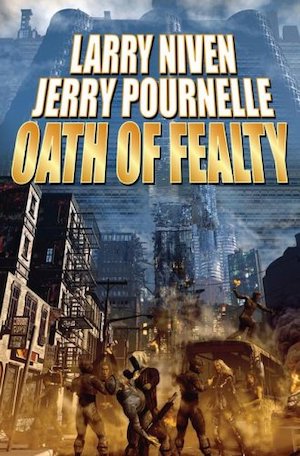
Todos Santos is an arcology, a 1000-foot-tall city/building erected in the ruins of a riot-leveled section of Los Angeles. A shining example of success—in fact, the only successful arcology to date—one might expect the community to be revered as an example to emulate by the rest of L.A. Instead, the insular arcology and its host city have a relationship best described as mutually hostile. Todos Santos’ situation becomes even more fraught when the community is targeted by terrorists.
But where are the Canadians, you ask? Oath of Fealty adopts one trope from utopian tales: the outsider to whom the realities of daily life in Todos Santos can be explained at length. That role falls to Sir George Reedy, Deputy Minister for Internal Development and Urban Affairs, Dominion of Canada.2 Alas, that “Sir” immediately suggests unfamiliarity on the part of the authors with the 1919 Nickle Resolution (reaffirmed in 1968), which directed that Canadians no longer be bestowed with foreign titles. Non-Canadians who might doubt just how firm Canada is on this point need only ask Conrad Black, Lord Black of Crossharbour, what it took for him to acquire a title.
***
Systemic Shock by Dean Ing (USA) (1981)
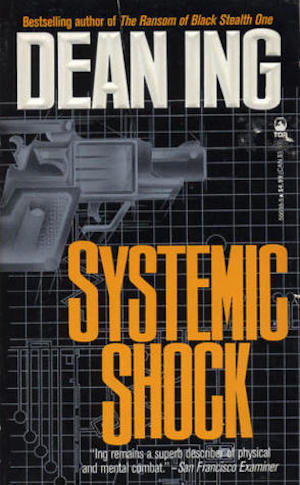
1985’s World War Three reshaped the world order but managed—somehow—to avoid a full-blown nuclear exchange. 1996’s World War Four addressed this oversight, as a series of unfortunate decisions catapult the Allies (North America, Europe, and Russia, plus a handful of others) and SinoInd (an alliance of southerly nations reaching from Brazil to India and China) into a global thermonuclear exchange. Youngster Ted Quantrill survived nuclear war and the plagues that followed. His talent for killing made him a critical resource for a fractured America determined to prevail.
Canada plays an indirect but important role in Quantrill’s new circumstances. Although Canada’s small population is highly urbanized, thus extremely vulnerable to nuclear annihilation, Ing’s Canada is one of the major post-war powers in this novel. Somehow. Although near-certain almost total depopulation and a shattered industrial base would seem insurmountable impediments to martial prowess, Ing’s version of Canada prevails to confound our enemies and annex the northern third of the US. For said annexed territory’s own good, of course.
***
I, Martha Adams by Pauline Glen Winslow (UK) (1982)
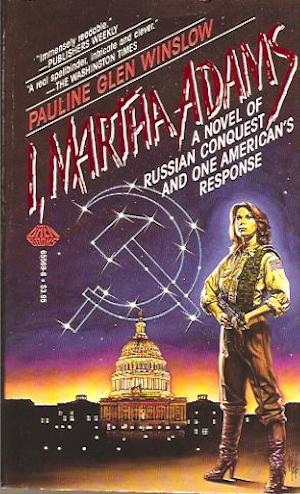
Thanks to President Carmody’s neglect of Reagan’s defense programs, Soviet missiles launched from Panama and Cuba annihilate America’s nuclear arsenal. Americans may now look forward to comprehensive restructuring—another term for rampant looting—as the defeated nation is integrated into the glorious socialist world order. Or rather, they could, if were it not for the fact that thanks to certain documents left by her late defense contractor husband, patriot Martha Adams is on the track of a nuclear superweapon powerful enough to drive the Red Menace from American shores.
Not to belabour the point but one might expect that since Canada has fewer people than some major cities, the dastardly Reds would have collected us along with the Americans. Not so, for a rather curious reason. The Reds, or at least Winslow’s Reds, reject possession of Canada as too Asiatic…to quote the novel:
New reports of huge numbers of Chinese agents and saboteurs at large in the Canadian population now infuriated him, especially since up until recent years it would have been impossible for this to have happened. Any Oriental in British or French Canada had been conspicuous. Then that fool of a Prime Minister had filled the nation with so many Orientals that it was beyond the resources of any intelligence service to check each and every one.
While it’s true Canada was far more diverse by the 1980s than it had been, it didn’t take much to qualify as “far more diverse.” Even today, decades after Canada’s federal government rejected its traditional [note to self: find a nice way to phrase “incredibly racist”] standards to sieve potential immigrants, Asian Canadians are but a small fraction of the population, and that fraction was even smaller in 1984. Still, while unconstrained by factuality, Winslow’s bold take on Canada is a change from the more typical (and not entirely inaccurate, at least before 1970) perception of Canada as a continent-wide Sundown town.
***
Light Raid by Connie Willis (USA) and Cynthia Felice (USA) (1989)
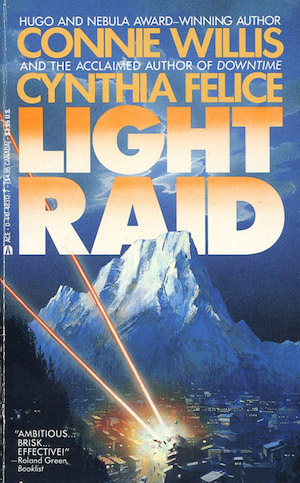
Life in war-torn North America is stressful. Being evacuated from Denver to neutral Victoria is traumatic for young Ariadne; as is so often true, evacuees are seen less as unfortunates to help and more as resources to exploit. Ariadne has it worse than most, because her father is a useless drunk, while her mother is accused of treason. What can poor Ariadne, protagonist of a book calculated to appeal to readers her age, possibly hope to do that will make a difference for her, her family, or her nation?
This North America of tomorrow has been comprehensively reshuffled. Canada in its current form does not exist. That said, not only does our heroine find herself in what is currently British Columbia, but the major antagonist in this novel is Quebec. And what a Quebec! Neither possessed of a vast population or prodigious birthrate, Quebec is outnumbered about 45:1 by the populations of the rest of Canada and the United States. Nor do current birthrates suggest that the situation will change in Quebec’s favour. Nevertheless, this Quebec of Tomorrow is able to hold its own in the face of far larger nations. Willis and Felice’s faith in Quebec’s prowess is inspiring.
***
Of course, this is hardly a comprehensive list. Feel free to mention other noteworthy examples in the comments below.
In the words of Wikipedia editor TexasAndroid, prolific book reviewer and perennial Darwin Award nominee James Davis Nicoll is of “questionable notability.” His work has appeared in Publishers Weekly and Romantic Times as well as on his own websites, James Nicoll Reviews and Young People Read Old SFF(where he is assisted by editor Karen Lofstrom and web person Adrienne L. Travis). He is a four-time finalist for the Best Fan Writer Hugo Award and is surprisingly flammable.
[1]As was often true in Shaw’s near-future fiction, the forces of nationalism have broken large regions into smaller ones. In this example, Alberta left Canada. As Shaw was no doubt aware, independence movements are an entrenched tradition of Canada, dating back to the year after Confederation. Pretty much every province has had at least one sovereignty movement. Ontario has an interesting twist on this; some northern Ontarians feel neglected by Queen’s Park in Toronto and would like to form their own province.
[2]I don’t think I can fit a comprehensive explanation of the significance of “Dominion” as it applies to Canada or the associated “dominion status” as it applies to British colonies in one footnote. Think of dominion status as the lite beer of national sovereignty. The term was archaic by 1981 (although points to the authors for having heard of it at all) and the last significant relic, Dominion Day, was renamed Canada Day the following year.










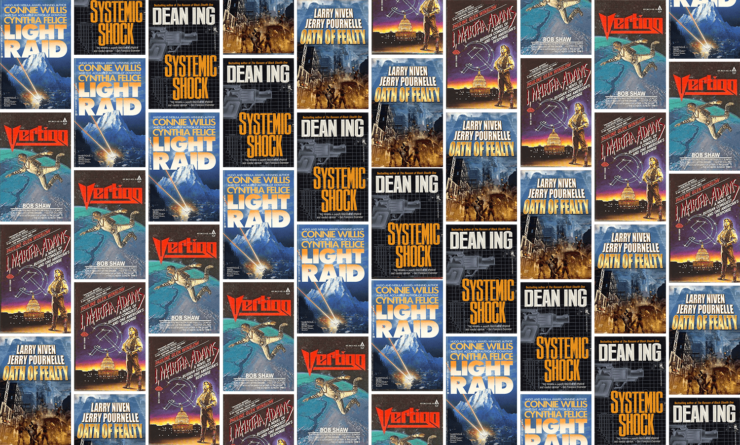
This sort of thing is fractal, of course. I know someone whose Toronto employer was astounded to discover it is possible to get from Kitchener, Ontario, to Toronto, also Ontario, in the winter. Kitchener and Toronto are connected by the 401, North America’s busiest highway.
I am surprised that a 1980s UK author would produce a novel that so directly appealed to US, rather than UK, versions of racism and anti-communist paranoia.
According to the SFE, Winslow moved to the US at some point. In any case, if she was mainly selling to US publishers, it would make sense to shape books with a US audience in mind. See, for example, the SF of Eric Frank Russell.
Elizabeth Bear’s Jenny Casey series (starting with Hammered) is an example of “Canada unexpectedly emerges as major world military power while U.S basically implodes,” by consripting the entire population. I recall being vaguely annoyed by the way that everyone connected to Canada swore in French, which is not something we usually do.
The overall depiction of Canada in Marvel Comics, where it appears to be populated largely by sinister government conspiracies, talking wolverines, and cannibal spirits leaps to mind. I think one comic even clarified that certain curses were geographically bound, and only took effect once you passed over the Canadian border.
I think it was Bear’s Scardown where the Chinese kill thirty million people in Ontario by hurling a hilariously small rock at a moderate velocity at Toronto. There are at present under 15 million people in Ontario and even high population growth scenarios don’t get us to 30 million. In any case the rock as described would have fragmented so high in the atmosphere someone directly under it would have been fine.
In the context of our history with e.g. residential schools (where students had worse chance of surviving than a soldier at the Somme), Marvel’s Department H is not an entirely unreasonable guess at how we’d handle superhumans. That said, Howard the Duck understated the degree of urbanization somewhat.
Clive Cussler (of “Raise the Titanic” fame) had a book where the US bought Canada from the UK early last century and then forgot about it until the 1980’s. Much Cusslerian hilarity ensued. I think that was the last of his books I read, unless the one where Imperial Rome sent an expedition to Texas came out later. I know his stuff has been unreadable since I hit 20 years old or so.
My only personal experience with Canada happened in the winter of 1982/83 when my family took the train from DC to Montreal and spent the day with a friend of Dad’s who had a polar bear rug (with 3 .308 inch holes in the chest area), followed by a trip to Vancouver via Via (the Canadian passenger railroad).
For some reason this article made me watch all Robin Sparkles’ back catalogue on YouTube.
’We’re talking Ivor Wynne stadium in Hamilton – just outside Guelph – it don’t get any bigger than that!’
Kristi @@.-@:
Canadians don’t swear in French? Tabarnak de câlisse! Who knew?
Heinlein’s Friday (1982) features a completely Balkanized North America, including one nation known as British Canada in which the title character spends some time frolicking as a fourth to a polyamorous threesome.
Some of the “parahumans” in the web series Worm are Canadian, most notably the “tinker” Dragon, who is secretly an AI but pretends to be a woman wearing powered armour.
Dragon runs the Birdcage, the USA’s inescapable prison for parahumans, which seems a little unlikely. She also seems to be completely obedient to the US authorities, which is partly justified by programming, and frequently acts to enforce the law in the USA. I think that the author may possibly be a little fuzzy on the actual status of the USA and Canada as separate countries…
rpresser @11: And one of the important secondary characters, Georges Perrault, is from Quebec, also an independent nation.
@10 Well, as I recall it, for the first two books the swearing was well… French and not French Canadian. The third book fixed this up, but it really broke my disbelief every time a character tossed out a merde instead of tarbarnac.
@14, well, to be completely fair, Western Canadian Anglos do say merde. Use of the word tabarnac immediately identifies you as “some kind of Easterner.” XD
Time has mercifully removed from my memory the name of the American author who was utterly convinced Quebec was Vichy territory during WWII.
There’s a funny bit in Orson Scott Card’s long out of print Capital where Those Darn Quebecois, being red commie socialist leftists as all nationalist movements are, invite in the Assembled Communist Hordes to bivouac along the Quebec/US border. The US is notoriously tolerant where Soviet arms build-ups near their borders are concerned, so nothing is done and America is crushed by Soviet forces. The PQ aren’t especially left wing and many of them think well of the US but providentially there’s a language barrier that prevents them from communicating this to the US. See Jean-François Lisée’s hilarious 1990 In the Eye of the Eagle for more details on the Quebec/US relationship.
Harry Turtledove has the US conquering and occupying Canada (except for Quebec, which the US created as an allied nation (and which aided in the occupation of the rest of Canada). Whole lot of Tabarnak usage…
Ah, yes. Turtledove’s sources provided him with details like local elevations but not that what is currently Kitchener, Ontario was still Berlin, Ontario when the American rascals swept in. It’s pretty unlikely the referendum to rename Berlin in honour of the man who pioneered concentration camps would have proceeded as it did in our history in Turtledove’s world. He also overlooked our vibrant Mennonite community (perhaps because the Mennonite way of dealing with governments whose policies they disagreed with does not lead to delicious plot).
If alternate history counts how about Harry Turtledove’s “Southern Victory” series?
@19: The Southern Victory series is what I’m talking about in @17
While it’s not stated explicitly in the book, the setting of the Strugatsky’s “Roadside Picnic” may be Canada.
21: Really? I didn’t pick up on that at all.
@6 I think we got British refugees. She did get the Canadian dream of obliterating Toronto right.
I’m not sure Roadside Picnic is supposed to be anywhere in particular but I too got a sense it might be set in Canada.
My knowledge of Canada all comes from Robertson Davies novels, James Nicoll’s descriptions of personal (near-)catastrophes, one trip to Montreal, and driving from my Mom’s ancestral home of Detroit to my Dad’s ancestral home of Hadley, Massachusetts.* (Oh, and reading (and quite enjoying!) Light Raid!) So I figure I’m well set up to write an SF novel set there!
(*The time we wanted to visit the Canadian side of the Niagara Falls in 2007 or so we ended up not going because we didn’t have passports. The Canadians would have happily let us in, but there was no guarantee the US border guards would let us back!)
Oh, and Derek Kunsken’s characters in The House of Styx do say “Tabarnak!” a lot. To be sure, they are Quebecois who have moved to Venus, apparently in search of nicer weather.
25: He was born in Cobourg, Ontario, and went to UGuelph,so he should be familiar with Canadianism.
Although most of “Hiero’s Journey” and “Unforsaken Hiero” by Sterling Lanier don’t actually take place in future Canada, the main character is from one the “Metz Republic” which is one of the two Canadian successor states (the other being the Otwah League) in the duology and the two successor states are the main opposition to the Big Bads of the duology.
Love this topic! Don’t forget Rudy, the ex-Mountie/head of moon policing in Andy Weir’s Artemis.
@27 I thought of Heiro also.
Spider Robinson is US born, and has written lots of Canadian characters and settings. Of course, he has long been a Canadian citizen, so perhaps he doesn’t fit the bill.
I was re-reading Heinlein’s Door Into Summer over the weekend. There’s a tossed-off reference to England becoming a province of Canada…
On Canada in the Marvel universe: proper representation at last in The Unbeatable Squirrel Girl! The writer Ryan North was born in Ottawa and lives in Toronto, and Squirrel Girl’s parents live in Canada. Doreen moved to New York City to attend Empire State University, majoring in computer science, but I’m not clear on her citizenship status. As far as I know she’s still Canadian-only on the citizenship front.
Clive Barker set part of Cabal in Calgary. On reading that bit I had the overwhelming impression that he’d never been here.
And as I recall, Bob Shaw had rhododendrons growing in Red Deer. The climate would have to change quite a bit for that to be possible.
@@@@@ 24, ecbatan
My knowledge of Canada all comes from Robertson Davies novels, James Nicoll’s descriptions of personal (near-)catastrophes, one trip to Montreal, and driving from my Mom’s ancestral home of Detroit to my Dad’s ancestral home of Hadley, Massachusetts.* (Oh, and reading (and quite enjoying!) Light Raid!) So I figure I’m well set up to write an SF novel set there!
I love Roberson Davies. He got better over time, which says a lot. Tempest-Tost, his first novel showed you an editor of a small-town newspaper at work. It’s a visit to a lost age. Of paper mail and typewriters and linotype machines. Of scanning other newspapers for tit-bits he can steal for insertion when the story ends before the column does.
Davies even fits around here; at least in one book. When Davies was Master of Massey College, his contribution to the annual Gaudy was an original ghost story. They are collected in High Spirits.
Derek Kunsken has the added advantage of currently living in Ottawa-Gatineau, as I do. So he’s got some clue as to what current Franco-Québecois slang might become.
He’s also a member of the organizing committee for CAN-CON, Ottawa-Gatineau’s local/national SF litcon.
It’s been a long time since I read Davies but I remember his work being filled with supernatural elements. Not to mention Tempest Tost has 830 people in the audience–many of whom paid!–for its amdram of The Tempest. If I am pessimistic, that sort of support for community theatre seems like fantasy but perhaps it’s actually science fiction!
John Wyndham’s The Chrysalids takes place in Labrador, post nuclear war. Also, Magnus, Robot Fighter was set in the part of North Am we now know as Ottawa!
Roadside Picnic is not set in Canada? It didn’t seem possible that it be anywhere else, to me. However, that obviously shows that it doesn’t belong here. James’ selection are all stories that show how little their authors know of Canada (doesn’t one of Connie Willis’ books start in Saskatoon? And more convincingly), while Roadside Picnic’s setting seems Canadian, without ever claiming to be.